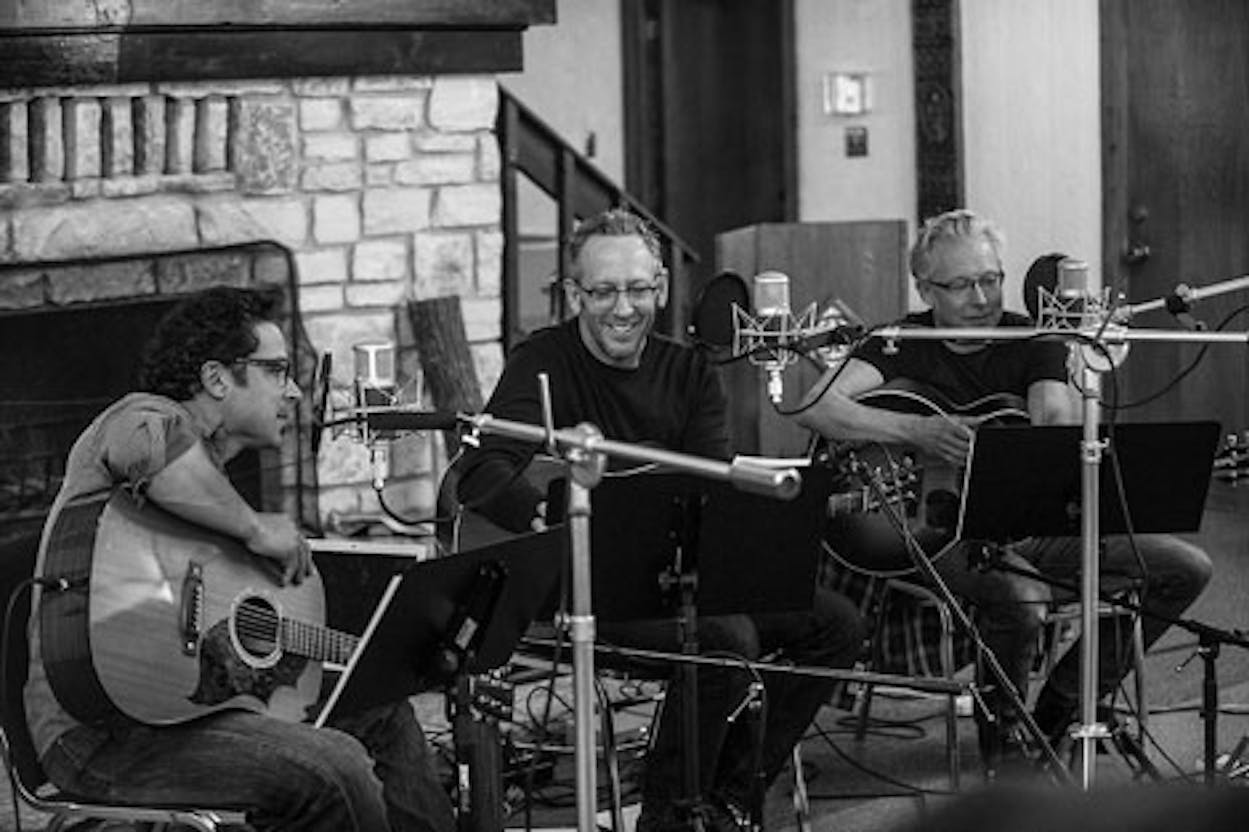Sergeant First Class Scott McRae was reluctant to attend a songwriting retreat for soldiers. He did not like to talk to strangers about his Army career and he did not see the point of writing songs. He was not artsy; he did not like to share his feelings. He was a career infantryman, a self-described crusty old guy.
But after a friend repeatedly suggested that he go to the retreat where soldiers are encouraged to express their war and home-front stories through music, McRae, 40, agreed. He said he figured that it might do the junior soldiers some good to hear his stories about recovering from a traumatic brain injury and overcoming his struggles with drinking. Besides, with a broken marriage and three combat deployments behind him, he was looking forward to a weekend away. And the retreat was free.
So on a recent weekend, McRae traveled to the retreat, Songwriting With: Soldiers, which was held at a facility near Fort Hood. The retreat was the brainchild of Darden Smith, a singer-song writer from Texas who knew from doing workshops with children that music could give people confidence.
After Smith and Radney Foster wrote “Angel Flight” in 2009, a song about bringing dead service members home, Smith was approached by LifeQuest Transitions, a nonprofit group that helps wounded soldiers adapt to civilian life, about hosting a retreat for soldiers in Colorado. In 2010 he started working with groups of veterans and soldiers, and it went so well he started Songwriting With: Soldiers.
“We’re using the process of songwriting to tell their stories,” said Smith, 50. “This is in service to them.”
In October, he held a solider songwriting retreat in Bell County, home to Fort Hood, one of the country’s largest military bases. He was joined by Foster, 53, and Jay Clementi, 40, singer-songwriters with Billboard hits, and they each worked one-on-one with the seven soldiers and two veterans who enrolled in the weekend-long retreat. All the soldiers were struggling with living outside a combat zone, and nearly everyone was in therapy.
Sergeant McRae was paired with Clementi. “I usually don’t talk much and definitely not about my emotions,” McRae said when Clementi asked him to talk about himself. Clementi smiled and they continued working together.
In the next hour, McRae opened up about his deployments, his divorce and the challenge of leading men. He said when he returned from combat, he felt numb and detached from his family. Arguments were frequent, and he started drinking. His wife eventually left him and took their children.
“The war was easy,” McRae said. “It was the war of words with my wife that was tough.”
“What were some of the things she said?” Clementi said.
McRae paused, set his jaw and said, “To this family you’re a ghost.”
Into the song it went.
That weekend Staff Sergeant Eustacio Obregon, who deployed four times to Iraq as a petroleum supply specialist, composed a song with Sergeants McRae and Josh Hartman, 43, about firefights, friends who were killed in battle and repeat deployments.
“This is a way to open up a little more about what we’ve been through,” Obregon, 38, said. “This song is something that’s mine, this is my life. I can bring this song home and play it for my kids and they can understand what I’ve been through.”
Karen Vandiver, a psychotherapist who works with veterans and soldiers, helped select those who attended the camp. Most of them have post-traumatic stress disorder.
“Songwriting is very healing and it needs the same focus as psychotherapy,” Vandiver said. “When you focus on your issue in an intense way, you get insight and often closure.”
For some, the camp’s pleasure was more prosaic. Since Sergeant First Class Nikki Shaw, a thirty-year-old Army medic, returned from Iraq and Kuwait in June, she had had trouble sleeping. During the two-night camp, she slept through the night.
Foster said that type of progress was reason enough to keep holding the retreats. The singers hope to raise enough money to host four more retreats next year and eight in 2014.
When executives at the Bob Woodruff Foundation, a nonprofit organization devoted to injured service members, heard of the camp, they donated. Colleen McDonough, president of The American Society of Composers, Authors and Publishers Foundation, which has financed workshops for children and the elderly, said her organization also believes in the therapeutic nature of music and also provided funding to the camp.
The plan is to offer retreats near military installations for soldiers and veterans from all service branches.
“This isn’t about guys sitting around and singing songs,” said Anne Marie Dougherty, the director of the Bob Woodruff Foundation. “This is about suicide prevention and giving them hope and confidence to get on with their life.”
By the retreat’s end, the musicians and soldiers had written 10 songs and had them professionally recorded. Each soldier was given a copy and received co-author credits. The songs may eventually be used on an album of retreat songs.
Afterward, they soldiers reflected on their experience, using words like “inspiring,” “cathartic” and “validating.”
“This retreat restored my faith in humanity,” said McRae, the last to speak, as tears streaked his face.







